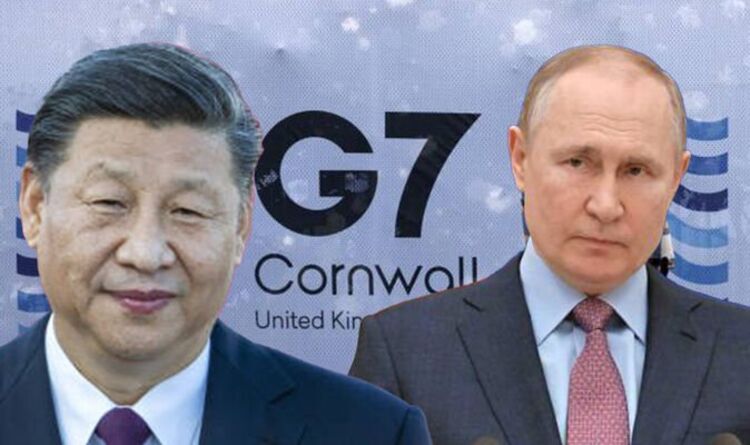Vladimir Putin describes the assassination attempts against him
We use your sign-up to provide content in ways you’ve consented to and to improve our understanding of you. This may include adverts from us and 3rd parties based on our understanding. You can unsubscribe at any time. More info
Political fractures with the West are something Russian President Vladimir Putin has become familiar with during his time in office. Though attention is currently focused on his relationship with the North Atlantic Treaty Organisation (NATO) it’s not the first time President Putin has come to blows with an international group.
In 2014, Moscow had its membership to the Group of Eight – commonly referred to as the G8 – suspended after Heads of State from the group reached an agreement.
The move came shortly after President Putin had illegally annexed the Ukrainian peninsula of Crimea.
Nearly three years passed before the Kremlin decided to permanently walk away from the G8.
At the time Moscow said it had no intention of re-joining the influential bloc even if it was invited to do so.


Instead, President Putin diverted his attention to the G20 – a much wider group of countries which includes emerging economies such as Brazil and Mexico.
According to the Kremlin’s spokesman, Dmitry Peskov, Russia’s involvement in the G8 was “not being discussed in Moscow in any way”.
Russia was originally admitted to the group in 1998, transforming it from the G7 to the G8.
However, following Moscow’s exit, members now consist of Canada, France, Germany, Italy, Japan, UK and US.

In June 2020, members of the G7 – including the UK and Canada – opposed an invitation from former US President Donald Trump for Russia to return to the group.
Speaking at the time Mr Trump said the G7’s “outdated group of countries” should be expanded to include others, including Russia.
Why has China never been a member of the group?
China and the G7 have long-held strained relations, owing to criticism from the group of Beijing’s domestic affairs.
DON’T MISS:
‘This is huge’ Putin faces ‘biggest defeat’ yet [EXPLAINED]
Putin bowel cancer speculation fuelled by ‘Moon face’ fears [INSIGHT]
Angela Rayner ridiculed over Russia nuclear weapons claim [WATCH]

China’s human rights record and its support for Russia in recent years pose two examples of issues that would need to be remedied between the parties.
Following a summit held last summer leaders of the G7 countries released a joint statement, urging China to “respect human rights and fundamental freedoms”.
Issues highlighted included abuses against the Uyghur Muslim minority group and the crackdown on Hong Kong pro-democracy activists.
Beijing hit back at the G7 and accused it of making “baseless accusations” against its Government.
Experts generally agree that China has detained as many as a million Uyghurs and other Muslims and imprisoned hundreds of thousands more in its crackdown in Xinjiang, which began in 2017.
Meanwhile, Beijing has previously warned G7 leaders that the days when a “small” group of countries decided the fate of the world were long gone.
A spokesman from China’s embassy in London said: “We always believe that countries, big or small, strong or weak, poor or rich, are equals, and that world affairs should be handled through consultation by all countries.”
Source: Read Full Article
